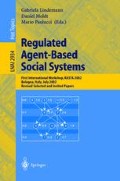Abstract
An agent based tool for analysing consumers/markets behaviour under several rate of information diffusion is described. This methodology allows for the study of tradeoffs among several variables of information like product advertisement efforts, consumers’ memory span, and passing word among friends in determining market shares. Insights gained by using this approach on an hypothetical economy are reported.
Access this chapter
Tax calculation will be finalised at checkout
Purchases are for personal use only
Preview
Unable to display preview. Download preview PDF.
References
Bettman, J.: An information processing theory of consumer choice. Addison Wesley, Reading (1979)
Bettman, J., Luce, M., Payne, J.: Constructive consumer choice processes. Journal of Consumer Research, 187–217 (1988)
Brian, A.W.: Inductive reasoning and bounded rationality. American Economic Review, 406–411 (1994)
Currim, I.: Disaggregate tree-structured modeling of consumer choice data. Journal of Marketing Research, 253–265 (1988)
Degeratu, A.M., Arvind, R., Wu, J.: Consumer choice behavior in online and traditional supermarkets: The effects of brand name, price, and other search attributes. International Journal of Research in Marketing, 55–78 (2000)
Guadagni, P., Little, J.: A logit model of brand choice calibrated on scanner data. Marketing science, 203–238 (1983)
Hales, D.: An open mind is not an empty mind - experiments in the metanoosphere. The Journal of Artificial Societies and Social Simulation (JASSS) (1998)
Hoyer, W.: An examination of consumer decision making for a common repeat purchase product. Journal of Consumer Research, 822–829 (1988)
Lynch Jr., J.G., Ariely, D.: Wine online: search costs and competiotion on price, quality and distribution. Marketing Science, 1–39 (2000)
Kephart, J.O., Hanson, J.E., Levine, D.W., Grosof, B.N., Sairamesh, J., Segal, R., White, S.R.: Dynamics of an information-filtering economy. In: Cooperative Information Agents, pp. 160–171 (1998)
Lomuscio, A., Wooldridge, M., Jennings, N.R.: A classification scheme for negotiation in electronic commerce. In: AgentLink, pp. 19–33 (2001)
Maes, P.: Agents that reduce work and information overload. Communications of the ACM, 31–40 (1994)
Neri, F.: An agent based approach to virtual market place simulation. In: Congresso dell’Associazione Italiana Intelligenza Artificiale (AIIA 2001), pp. 43–51 (2001)
Neri, F., Saitta, L.: Exploring the power of genetic search in learning symbolic classifiers. IEEE Trans. on Pattern Analysis and Machine Intelligence PAMI-18, 1135–1142 (1996)
Rocha, A.P., Oliveira, E.: Agents advanced features for negotiation in electronic commerce and virtual organisations formation process. In: Sierra, C., Dignum, F.P.M. (eds.) AgentLink 2000. LNCS (LNAI), vol. 1991, p. 78. Springer, Heidelberg (2000)
Rodriguez-Aguilar, J.A., Martin, F.J., Noriega, P., Garcia, P., Sierra, C.: Towards a test-bed for trading agents in electronic auction markets. AI Communications 11(1), 5–19 (1998)
Sierra, C., Jennings, N., Noriega, P., Parsons, S.: A framework for argumentation based negotiation. In: Rao, A., Singh, M.P., Wooldridge, M.J. (eds.) ATAL 1997. LNCS (LNAI), vol. 1365, pp. 177–192. Springer, Heidelberg (1998)
Smith, M.D., Bailey, J., Brynjolfsson, E.: Understanding digital markets: review and assessment, Draft available at http:ecommerce.mit.edupapersude, pp. 1–34 (2001),
Viamonte, M.J., Ramos, C.: A model for an electronic market place. In: Sierra, C., Dignum, F.P.M. (eds.) AgentLink 2000. LNCS (LNAI), vol. 1991, pp. 3–28. Springer, Heidelberg (2001)
Wright, P.: Consumer choice strategies: symplifying vs optimizing. Journal of Marketing Research, 60–67 (1975)
Author information
Authors and Affiliations
Editor information
Editors and Affiliations
Rights and permissions
Copyright information
© 2004 Springer-Verlag Berlin Heidelberg
About this paper
Cite this paper
Neri, F. (2004). Modeling Product Awareness Rates and Market Shares. In: Lindemann, G., Moldt, D., Paolucci, M. (eds) Regulated Agent-Based Social Systems. RASTA 2002. Lecture Notes in Computer Science(), vol 2934. Springer, Berlin, Heidelberg. https://doi.org/10.1007/978-3-540-25867-4_8
Download citation
DOI: https://doi.org/10.1007/978-3-540-25867-4_8
Publisher Name: Springer, Berlin, Heidelberg
Print ISBN: 978-3-540-20923-2
Online ISBN: 978-3-540-25867-4
eBook Packages: Springer Book Archive

